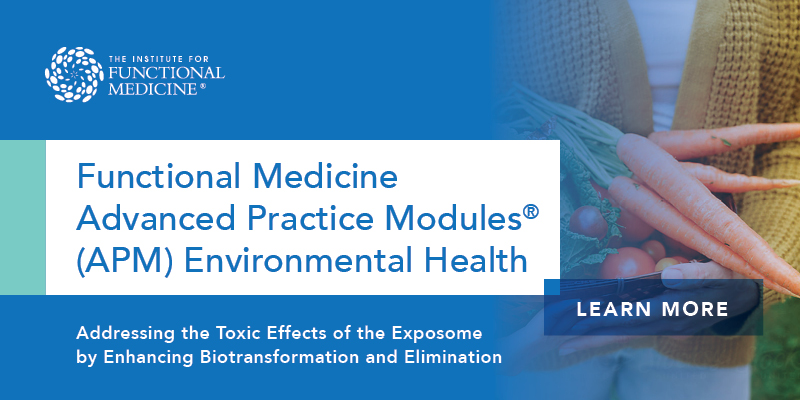Livestream
- Up to 18.5 CME Credits Available
- Live Q&A with presenters
This module will review the foundational biochemistry and genetics of biotransformation pathways, connect organ system dysfunctions to potential toxic exposures, and detail the available laboratory evaluations useful in assessing both the toxic load and physiologic responses to toxicant and toxin exposures. This program also uses a case-based, integrated approach to effectively deliver tools necessary for clinicians to diagnose and treat the toxic component of their patients’ total health pictures.
- Recognize the relationship between systemic disease and toxic exposures through a clear understanding of the pathophysiology of total toxic load and synergistic effects of both toxicants and toxins.
- Identify diseases and dysfunctions potentially associated with chronic toxicity and specifically recognize the relationships between chronic toxic insult and neurotoxicity, immunotoxicity, autoimmunity, mitochondrial dysfunction, endocrine disruption, and carcinogenesis.
- Apply the PURE principles for managing patients with toxicity concerns (Pattern recognition, Undernourishment, Reduce toxins, Ensure a safe detox).
- Integrate screening questionnaires and detox-specific physical exam findings within a functional medicine intake to discover and assess relevant toxic exposures, and to also track individual’s responses to their environments along with therapeutic interventions.
- Recognize and address the most important antecedents, triggers, and mediators of toxic overload, including impaired biotransformation, dysbiosis, impaired excretion, and nutritional deficiencies.
- Appropriately apply and interpret reliable laboratory evaluations of toxic load and biotransformative capacity.
- Understand the practical aspects of and identify when to consider personalized dietary treatment using the IFM Elimination Diet and Detox Food Plan suites.
- Apply various nutraceuticals, botanicals, pharmaceuticals, and lifestyle interventions to increase mobilization, biotransformation, and elimination of toxic compounds in the body.
Environmental Health: Insights & Education
Biotransformation Pathways & Toxic Exposures
We have learned a great deal in recent years about how toxicants and toxins affect us, where they originate, and how to improve our ability to detoxify. Understanding toxicity and taking practical steps to improve biotransformation and elimination of toxicants are essential and critical pieces in any integrative approach to a patient’s health and well-being.
Explore more below about the biochemistry and genetics of biotransformation pathways, connections of organ system dysfunctions to potential toxic exposures, available laboratory evaluations useful in working up a toxin-exposed patient, and various treatment approaches.
.

Environmental Health Related Articles
Who is AFMCP designed for?
IFM encourages a multidisciplinary approach to patient care. We welcome a variety of licensed healthcare disciplines to AFMCP, including MDs, DOs, NDs, DCs, physician assistants, nursing professionals, and nutrition professionals.
Can I take another course before taking AFMCP?
Many learners find taking AFMCP first helps them to understand IFM’s proprietary tools, such as the Functional Medicine Matrix, and provides context for the skills, processes, and science behind incorporating Functional Medicine principles into practice. The course is offered multiple times each year in order to meet the needs of clinicians wishing to begin their IFM education with AFMCP. However, AFMCP is not a prerequisite to take any IFM course if you are comfortable with the material to be presented.
Will I be certified as a Functional Medicine practitioner after attending AFMCP?
No. AFMCP is one of seven required courses in the IFM Certification Program. In addition to AFMCP, you must complete the six Advanced Practice Modules as required coursework for the IFM Certification Program.
Will I be listed on the Find A Practitioner search after I attend AFMCP?
After attending AFMCP, you will be eligible to list your profile in our Find A Practitioner search as long as you are also enrolled in the IFM Membership Program. Before your profile is listed, however, you must fill in your practice information within your account profile to activate your profile to appear in the search.

Improve Liver Function
Nutrient support to the liver can reduce the body's overall toxic burden.

Common Toxic Exposures
Pesticides and a variety of other environmental chemicals contribute to dysfunction.

Pollutants & Diabetes
Persistent organic pollutants may contribute to the rise in metabolic syndrome.

Lead Exposure
Low levels of lead, found in blood and urine, are a risk factor for disease.

Plastics & Early Menarche
Endocrine disrupting chemicals can lead to reproductive health abnormalities.

Effects of Mold Toxicity
Chronic exposure to dampness, mold, and fungi may lead to respiratory dysfunction.

Learn About IFM's Experts on Environmental Health
Join Functional Medicine Newsletter
Sign up for IFM's weekly newsletter to receive functional medicine news and insights on topics such as nutrition, common conditions you see in your practice, and improving patient compliance.*



.jpg?width=721&height=424&name=Infographic_Environmental%20Health_horizontal-02%20(1).jpg)
.jpg?width=1043&height=382&name=Infographic_Environmental%20Health_horizontal-01%20(2).jpg)




